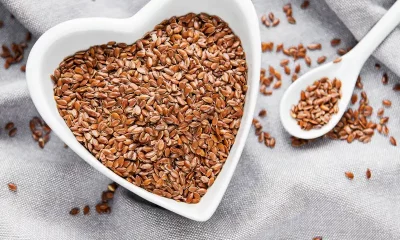Health
50 Super Healthy (And Very Often Cheap) Foods

Discover the 50 Super Healthy (And Very Often Cheap) Foods.
If we want to have a hell of a fish and pamper our body from the inside, we must eat healthily!
And eating healthy means choosing foods full of nutrients, not too high in calories, with good fats …
Yes, but there you go; what are these foods that are beneficial to our health and our body?
Well, look no further; I will list the products that you must have on your shopping list!
In addition, we tell you which foods are not expensive for each food.
Check out the list of the 50 super healthy (and very often cheap) foods. Look :
FRUIT AND BERRIES
Fruits and berries are among the most popular health foods in the world.
These sweet and nutritious foods fit easily into our diet.
They require little or no preparation.
1. Apples (cheap)
Apples are high in fiber, vitamin C, and contain antioxidants.
They are very filling and are a perfect snack if you feel hungry between meals.
So let’s eat apples, but not just any apples! Preferably organic apples.
Or if not, consider cleaning them before eating them with baking soda to remove as much of the pesticide as possible.
2. Avocado
Avocados are different from other fruits because they are high in healthy fats instead of carbohydrates.
Not only are they smooth and tasty, but they are also rich in fiber, potassium, and vitamin C.
3. Bananas (cheap)
Bananas are among the best sources of potassium in the world.
They are also rich in vitamins B6 and fiber and are convenient and easy to carry.
4. Blueberries
Blueberries are not only delicious but also among the most powerful sources of antioxidants in the world.
5. Oranges (cheap)
Oranges are known for their vitamin C content.
They are rich in fiber and antioxidants.
6. Strawberries
Strawberries are very nutritious and low in carbohydrates and calories.
They are loaded with vitamins C, fiber, and manganese.
Strawberries are arguably one of the most delicious foods around.
Other healthy fruits
Other beneficial fruits and berries include cherries, grapes, grapefruits, kiwi, lemons …
… mangoes, melons, olives, peaches, pears, pineapples, plums, and raspberries.
7. Eggs (cheap)
Eggs are among the most nutritious foods on the planet.
Previously maligned because they were high in cholesterol, studies ( here and here ) show that they are safe.
To be consumed without moderation, especially at breakfast.
MEAT
Unprocessed, gently cooked meat is one of the most nutritious foods you can eat.
8. Lean beef
Lean cuts of beef are one of the best sources of protein and iron.
But if you’re on a low-carb diet, be aware that you can still go for fatter cuts.
9. Chicken breasts (cheap)
Chicken breasts are low in fat and calories, but extremely high in protein.
This meat also contains many nutrients.
Then again, don’t hesitate to eat chunks of fatty chickens if you’re not consuming a lot of carbohydrates.
10. Lamb
Lambs are generally fed in the pasture. Their meat is therefore rich in omega-3 fatty acids.
NUTS AND SEEDS
Although they are high in fat and calories, nuts and seeds help you lose weight.
The conclusions of these studies ( 1 *, 2 * ) are formal.
These foods are crunchy, filling, and loaded with important nutrients.
They are particularly rich in magnesium and vitamin E.
In addition, they require almost no preparation and are therefore easy to integrate into your daily life.
11. Almonds
Almonds are a variety of nuts loaded with vitamin E, antioxidants, magnesium, and fiber.
Studies show that almonds can help you lose weight and boost your metabolism.
12. Chia seeds (cheap)
Chia seeds are among the most nutrient-dense foods on the planet.
In less than 30g, there are 11g of fiber and significant amounts of magnesium, calcium, and fiber.
13. Coconut
Coconuts are high in fiber and contain powerful fatty acids called medium-chain triglycerides.
14. Macadamia nuts
Macadamia nuts are very tasty.
They are especially very rich in monounsaturated fats and low in omega-6 fatty acids.
In other words, by eating macadamia nuts, you are consuming the right fats in the right proportions.
15. Hazelnuts (cheap)
Hazelnuts are very nutritious, rich in fiber, vitamins, and minerals.
VEGETABLES
Vegetables are among the most concentrated sources of nutrients in the world.
There is a wide variety of them providing all the calories we need.
It is therefore recommended to eat several different types of vegetables every day.
16. Asparagus
Asparagus is a popular vegetable.
It is low in carbohydrates and calories and very rich in vitamin K.
17. Peppers (cheap)
There are several colors of peppers, including red, green, and yellow.
They are crunchy and sweet and are a great source of antioxidants and vitamin C.
18. Broccoli (cheap)
Broccoli is a cruciferous vegetable that is eaten both raw and cooked.
It is an excellent source of fiber, vitamins C and vitamins K.
Broccoli also contains a reasonable amount of protein compared to other vegetables.
In addition, you can even eat the foot!
19. Carrots (cheap)
Carrot is one of the most popular vegetables.
It is extremely crunchy and loaded with nutrients such as fiber and K vitamins.
Carrots are also rich in beta-carotene (antioxidant), which contributes to the proper functioning of the body.
20. Cauliflower (cheap)
Cauliflower is a very versatile cruciferous vegetable.
It can be used to prepare a multitude of diet dishes but also tastes great on its own.
21. Cucumber (cheap)
Cucumbers are one of the most popular vegetables in the world.
They are very low in carbohydrates and calories and consist mostly of water.
However, they do contain several nutrients in small amounts, including vitamin K.
22. Garlic (cheap)
Garlic is incredibly healthy food.
It contains bioactive organosulfur compounds which have powerful biological effects.
Among other things, garlic improves the immune functions of our body ( 1 * ).
23. Kale
Kale is becoming more and more popular because it is incredibly high in fiber and vitamin C / K.
It is also packed with nutrients and adds a tasty crunch to salads and other dishes.
24. Onions (cheap)
Onions have a tangy and delicious flavor that works particularly well in many recipes.
They contain several bioactive compounds that are very beneficial to health.
25. Tomatoes (cheap)
Tomatoes are generally categorized as vegetables, although they are technically fruit.
They are tasty and loaded with nutrients such as potassium and vitamin C.
Other healthy vegetables
Most vegetables are very healthy.
Among those worth mentioning are artichokes, Brussels sprouts, cabbage, celery …
… Eggplant, leeks, lettuce, mushrooms, radishes, squash, chard, turnips, and zucchini.
FISH AND SEAFOOD
Fish and seafood are very healthy and very nutritious.
They are particularly rich in omega-3 fatty acids and iodine.
2 nutrients that most people are deficient in.
Studies even show that people who eat a lot of fish and seafood:
- Live longer
- Have a lower risk of being senile, depressed or contracting heart disease ( 1 *, 2 *, 3 * ).
26. Salmon
Salmon is a very popular oily fish due to its excellent taste.
It contains many nutrients, including protein and omega-3 fatty acids.
It is also responsible for vitamin D.
Be careful, however, not to consume farmed salmon, but wild salmon.
27. Sardines (cheap)
Sardines are small, oily fish that are among the most nutritious foods you can eat.
They contain considerable amounts of nutrients that your body needs.
28. Shells
Shellfish fall into the same category as offal in terms of nutrient density.
Edible shellfish include clams, mollusks, and oysters.
29. Shrimps
Shrimp is a type of crustacean related to crab and lobster.
It is low in fat and calories but is high in protein.
It is also loaded with various other nutrients, including selenium and vitamin B12.
30. Trout (cheap)
Trout is another delicious type of freshwater fish, similar to salmon.
31. Tuna (cheap)
Tuna is very popular in Western countries.
It is low in fat and calories while being high in protein.
It is perfect for people who need to add more protein to their diet.
However, care should be taken to purchase varieties that are low in mercury.
CEREALS
Although cereals have had a bad reputation in recent years, some are very good for you.
Just keep in mind that they are high in carbohydrates.
They are therefore not recommended if you are on a low carbohydrate diet.
32. Brown rice (inexpensive)
Rice is one of the most popular grains.
It is currently a staple food for more than half of the world’s population.
Brown rice is quite nutritious, with an acceptable amount of fiber, vitamins B1, and magnesium.
33. Oats (cheap)
Oats are incredibly healthy food.
This cereal is loaded with nutrients and active fibers (beta-glucans) providing multiple benefits.
34. Quinoa (cheap)
In recent years, quinoa has become incredibly popular among health-conscious people.
It is a tasty grain rich in nutrients, like fiber and magnesium.
It is also an excellent source of protein of plant origin.
BREAD
Most people eat a lot of highly processed white bread.
For those trying to adopt a healthier diet, it can be extremely difficult to find quality bread.
Solutions do exist despite everything.
35. Ezekiel Bread
Ezekiel bread is perhaps the healthiest bread you can buy.
It is made from organic and sprouted whole grains, as well as several legumes.
36. Homemade bread (cheap)
Overall, the best bread choice might be the one you can make yourself.
Here is an easy recipe that you can use at home (gluten-free) to make your bread.
LEGUMES
Legumes are another food group that has been unfairly criticized.
Well, they indeed contain substances that can interfere with the digestion and absorption of nutrients.
But it is enough to let them soak and to prepare them in a certain way to avoid this phenomenon ( 1 * ).
Therefore, legumes are an excellent source of protein from plant sources.
37. Green beans (cheap)
Green beans are very popular in Western countries.
They contain potassium and are rich in iron and vitamins.
They, therefore, help to keep fit.
38. Red beans (cheap)
Kidney beans are high in fiber, vitamins, and contain various minerals.
Be sure to cook them properly, as they are poisonous when raw.
39. Lentils (cheap)
Lentils are another popular legume.
They are rich in fiber and are among the best sources of protein from plant sources.
40. Peanuts (cheap)
Peanuts (which are legumes, not nuts) are incredibly tasty.
They are especially rich in nutrients and antioxidants.
Several studies even claim that peanuts can help with weight loss ( 1 *, 2 *).
However, take it easy on the peanut butter.
It is as calorific as it is delicious to taste!
DAIRY PRODUCTS
For those who tolerate them, dairy products are a healthy source of many important nutrients.
Whole dairy products are indeed particularly beneficial.
Studies show that people who drink have a lower risk of obesity and diabetes ( 1 *, 2 * ).
If dairy products come from grass-fed cows, they’re even more nutritious!
They are indeed richer in bioactive fatty acids such as conjugated linoleic acid (CLA) and vitamin K2.
41. Cheese
Cheese is an incredibly nutritious food.
1 single slice provides roughly the same amount of nutrients as a full cup (240ml) of milk.
For many, it’s also one of the most delicious foods you can eat.
42. Whole milk (cheap)
Whole milk is very rich in vitamins, minerals, quality animal proteins, and healthy fats.
Plus, it’s one of the best dietary sources of calcium.
43. Yogurt (cheap)
Yogurt is made from fermented milk and the addition of live bacteria.
It has the same health effects as milk.
Yogurt nevertheless has the advantage of containing probiotic bacteria which are excellent for intestinal flora.
GREASE AND OILS
Many fats and oils are now marketed as health foods!
This is particularly the case for several sources of saturated fat that were previously criticized.
44. Butter (cheap)
Butter from grass-fed cows is rich in many important nutrients, including vitamin K2.
45. Coconut oil
Coconut oil contains relatively high amounts of TCM (medium-chain triglycerides).
And that’s good news because MCTs bring a lot of benefits to our bodies.
They make it possible, for example, to fight against Alzheimer’s disease ( 1 * ).
Or to help lose belly fat ( 2 * ).
46. Olive oil
Extra virgin olive oil is one of the healthiest vegetable oils you can find.
It contains monounsaturated fats that are good for the heart.
It is also very rich in antioxidants while being very beneficial for health.
TUBERS
Tubers are the storage organs of certain plants.
They contain several nutrients that are beneficial for health.
47. Potatoes (cheap)
Potatoes contain just about all the nutrients the body needs.
They are rich in vitamin C, potassium and are super satiating.
One study analyzed 38 foods and found that boiled potatoes were the most nutritious (1 * ).
48. Sweet potatoes (cheap)
Sweet potatoes are some of the most delicious starches you can eat.
They’re loaded with antioxidants and all kinds of healthy nutrients.
49. Apple cider vinegar
Apple cider vinegar is incredibly popular with people looking for a healthy lifestyle.
Studies show that it:
Apple cider vinegar is excellent in dressing or for adding flavor to dishes.
50. Dark chocolate (cheap)
Dark chocolate is loaded with magnesium and is one of the most powerful sources of antioxidants on the planet ( 1 * ).
Health
14 Benefits of Oolong tea and side effects Table of Contents
Health
Contraindications of drinking green tea

Discover the contraindications of drinking green tea.
Drinking green tea in excess can cause some harmful side effects for the body, which are necessary to know
Green tea is one of the most popular in the world. In addition to having a characteristic flavor, its different properties make it a highly beneficial drink for health, mainly due to its antioxidant power. However, its consumption also includes a series of contraindications
Among the benefits of green tea highlights its ability to improve memory, helps lose body fat, increases physical performance, is stimulating, can prevent different types of cancer, and even reduce the risk of cardiovascular diseases.
Among all the types of green tea that exist, matcha stands out, a tea of oriental origin with important properties for health and that stands out for its powder composition. In recent years it has become the travel companion of celebrities, athletes, and famous people.
Contraindications of drinking green tea
Many people have incorporated green tea into their day-to-day. The truth is that it is a great choice since it can provide energy to face the workday, accelerate the metabolism, and can even help improve mood.
However, like any food, the consumption of green tea carries a series of contraindications that it is necessary to know.
Thus, from ‘Todo Disca’ we are going to expose some of the negative effects that the ingestion of this type of infusions can produce.
In this sense, researchers from the National Institute of Health of the United States affirm that the consumption of green tea mixed with different medications, such as contraceptive pills, antibiotics, stimulants, or alcohol can be harmful to health.
And these are some of the side effects that excess green tea consumption can generate for the body:
1. Irritability: Some people feel some discomfort at the time of their intake. That is to say, it produces an effect contrary to the one they seek at first.
2. Insomnia: Green tea can cause sleep problems for many people. And is that it is a stimulating drink that contains some doses of caffeine, although in a lower proportion than traditional coffee.
3. Dizziness and nausea: This infusion can be heavy for delicate stomachs and generate some type of gastrointestinal discomfort. Therefore, it is not advisable to take on an empty stomach.
4. Palpitations: Due to its stimulating characteristics, it can sometimes cause palpitations. Along these lines, experts recommend reading the indications and ingredients of all types of tea.
5. Disadvantages during pregnancy: Green tea is rich in tannins, so it can reduce the absorption of folic acid and iron. Due to this, this drink is not recommended for pregnant or lactating women.
Generally, green tea is an infusion with excellent health properties. In this way, moderate consumption usually brings different benefits to the body.
However, it is advisable to take these contraindications into account, and if you feel any side effects, see a medical specialist.
Through the following link, you will be able to know the contraindications to drink matcha tea, a variety of oriental origin widely established in Europe and whose consumption has become popular in recent years
Health
15 Benefits of pumpkin seeds and side effects

Table of Contents
- 1. Pumpkin seeds to boost the immune system
- 2. They are high in magnesium
- 3. Pumpkin seeds are low in calories
- 4. Pumpkin seeds are rich in iron
- 5. Relieve symptoms of irritable bladder
- 6. Pumpkin seeds are high in fiber
- 7. Benefits of pumpkin seeds for cholesterol
- 8. Pumpkin seeds are a natural anti-inflammatory
- 9. Pumpkin seed oil to counter the effects of menopause
- 10. Pumpkin seeds help healthy skin, hair and nails
- 11. Pumpkin seeds help eliminate kidney stones (kidney stone)
- 12. Pumpkin seeds are rich in vegetable protein
- 13. Pumpkin seeds are a great substitute for peanuts
- 14. benefits of pumpkin seeds on your hormonal health
- 15. Pumpkin seeds are a good source of potassium
- Discover the 15 powerful health benefits and virtues of pumpkin seeds and side effects.
They are packed with nutrients and vitamins, are high in protein, fiber and are low in calories!
-
1. Pumpkin seeds to boost the immune system
Pumpkin seed helps boost the immune system , especially because it is rich in zinc.
Remember that zinc allows the proper functioning of the immune system by ensuring optimal activity of T lymphocytes. Zinc could also help the body to better protect itself against colds, flu, conjunctivitis and other infections.
2. They are high in magnesium
Anxiety , migraines, muscle cramps and PMS can result from magnesium deficiency. A 28g serving of pumpkin seeds provides almost 20% of the recommended daily allowance.
The magnesium intervenes in the transformation of food into energy, the transmission of nerve impulses, muscle relaxation and the formation of bones and teeth.
- Acting with calcium and potassium, it regulates the heart rate and participates in the production of insulin.
Several studies have also demonstrated the virtues of magnesium in the prevention of cardiovascular disease.
3. Pumpkin seeds are low in calories
Pumpkin seeds are lower in calories than many nuts. A 28g serving of pumpkin seeds (2 tablespoons) without their raw shell has 126 calories, which is almost 40 calories less than almonds and 60 calories less than walnuts for a single serving.
4. Pumpkin seeds are rich in iron
Pumpkin seeds are a great source of iron. A 28g serving of pumpkin seeds provides almost 5% of the recommended daily allowance.
Remember that iron is essential for health and is involved in a multitude of functions in the human body, in addition to transporting oxygen through the body.
However, iron from plant sources is not as well absorbed as iron from animal sources. In this sense, it is recommended that vegetarians consume twice as much iron in order to ensure that they do not suffer from deficiencies that may in particular cause fatigue and weakness.
5. Relieve symptoms of irritable bladder
While more scientific studies are to be conducted on the subject to understand all of its mechanisms, pumpkin seeds are believed to help relieve symptoms of irritable bladder and urination disorders associated with benign prostatic hyperplasia (BPH). .
6. Pumpkin seeds are high in fiber
Pumpkin seeds also provide a healthy dose of fiber . A 28g serving of pumpkin seeds provides 5g of fiber, or 20% of the recommended daily intake.
In addition to calming hunger, fiber promotes healthy digestion and helps regulate bowel function.
7. Benefits of pumpkin seeds for cholesterol
The phytosterols in pumpkin seeds help lower ” bad” cholesterol levels . Phytosterol is the plant equivalent of cholesterol. However, rather than blocking the arteries, phytosterol rather helps to clean them, recalls WebMD.
8. Pumpkin seeds are a natural anti-inflammatory
Source of antioxidants, pumpkin seeds have an anti-inflammatory effect and thus help defend the body against damage caused by excess free radicals .
If free radicals oxidize DNA (the body’s genetic code) in a cell’s nucleus, a cell mutation can occur, which can start cancer. Oxidation of cholesterol in the blood can lead to the formation of fatty deposits in the arteries, which can lead to heart disease or stroke.
Excess free radicals are also involved in cataracts, immune deficiencies, arthritis and premature cell aging; their role in these diseases is the subject of intensive research.
9. Pumpkin seed oil to counter the effects of menopause
Researchers have studied the impact of pumpkin seed oil in better combating symptoms of menopause , including hot flashes and headaches.
While further studies need to be done, pumpkin seed oil has been shown to be effective in alleviating these symptoms in the subjects of this research.
10. Pumpkin seeds help healthy skin, hair and nails
The pumpkin seeds contain essential fatty acids, zinc, vitamin A and vitamin E . These nutrients help maintain glowing skin , strong, healthy hair and nails .
While more research is needed to confirm these benefits, a study with 76 participants also looked at the benefits of pumpkin seed oil in helping hair regrowth in men with alopecia.
In subjects who consumed 400mg of pumpkin seed oil for 24 weeks, regrowth was 40% greater than participants who took a placebo.
11. Pumpkin seeds help eliminate kidney stones (kidney stone)
Pumpkin seeds are also said to prevent kidney stones from forming . To better counter kidney stones, it is also recommended to drink plenty of water, limit sodium intake, and consume no more than 2g of vitamin C on a daily basis.
The kidneys are designed to remove particles of salts and minerals that end up in the ureter, a long, narrow duct leading to the bladder; they will then be expelled in the urine.
Problems arise when a chemical imbalance or other deficient process promotes the agglutination of particles, which turn into crystals and then into a kidney stone.
12. Pumpkin seeds are rich in vegetable protein
This food is also a good source of vegetable protein . A 28g serving of pumpkin seeds provides 5g of protein, or 10% of the recommended daily allowance.
The proteins include the ability to develop and maintain the muscles, in addition to help regulate and control hunger cravings.
Vegetarians and vegans, however, should make sure that their diet meets all their amino acid needs by combining different sources of plant protein (legumes and grain products, for example).
13. Pumpkin seeds are a great substitute for peanuts
In 10 years, cases of peanut allergy have doubled, forcing several schools to ban this food. Pumpkin seed butter is a good alternative.
At lunch or as a side dish for a snack, it will provide children with some of the essential fatty acids and proteins they need.
14. benefits of pumpkin seeds on your hormonal health
Pumpkin seeds may help women with hormonal imbalance due to the phytoestrogens they contain. However, further scientific studies need to be carried out to this effect.
The Extenso Nutrition Reference Center reminds us that phytoestrogens are compounds of plant origin which, when consumed in sufficient quantities, can act on your body in a manner similar to estrogen.
In addition to regulating the menstrual cycle, I pregnancy, and breastfeeding, estrogen helps prevent demineralization of your bones and keeps your blood vessels healthy.
15. Pumpkin seeds are a good source of potassium
Finally, pumpkin seeds provide a good source of potassium. A 28g serving provides 260mg of potassium , or nearly 7% of the recommended daily allowance.
Potassium is present in the form of a solution in the body and almost all of it is concentrated inside cells.
Like chlorine and sodium, it is an electrolyte, a substance that charges positively or negatively when dissolved.
The body needs a balance between potassium, chlorine and sodium to perform a multitude of essential functions.
We hope the article on the 15 powerful health benefits of pumpkin seeds has been of help.
-

 Food1 year ago
Food1 year ago10 + Benefits of carrot juice and side effects
-

 Benefits4 months ago
Benefits4 months agoThe Benefits of Joining Gym Lumolog – Improve Your Fitness & Health
-

 Health1 year ago
Health1 year ago5 Shocking health benefits of kinkeliba and side effects
-

 Food1 year ago
Food1 year ago8 shocking benefits of leek juice and side effects
-

 Health1 year ago
Health1 year agoBenefits of guava leaves Sensually
-

 Weight Loss1 year ago
Weight Loss1 year agoChaz Bono weight loss secret
-

 Health1 year ago
Health1 year ago13 shocking health benefits of Thai eggplant
-

 Food1 year ago
Food1 year ago19 Benefits of tobacco plant and side effects













